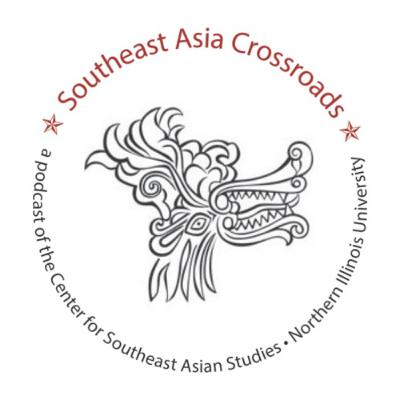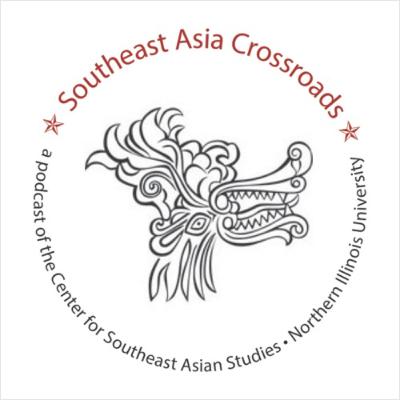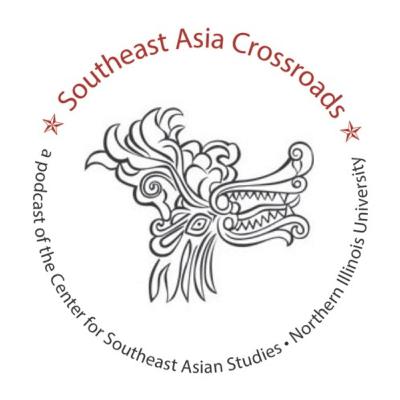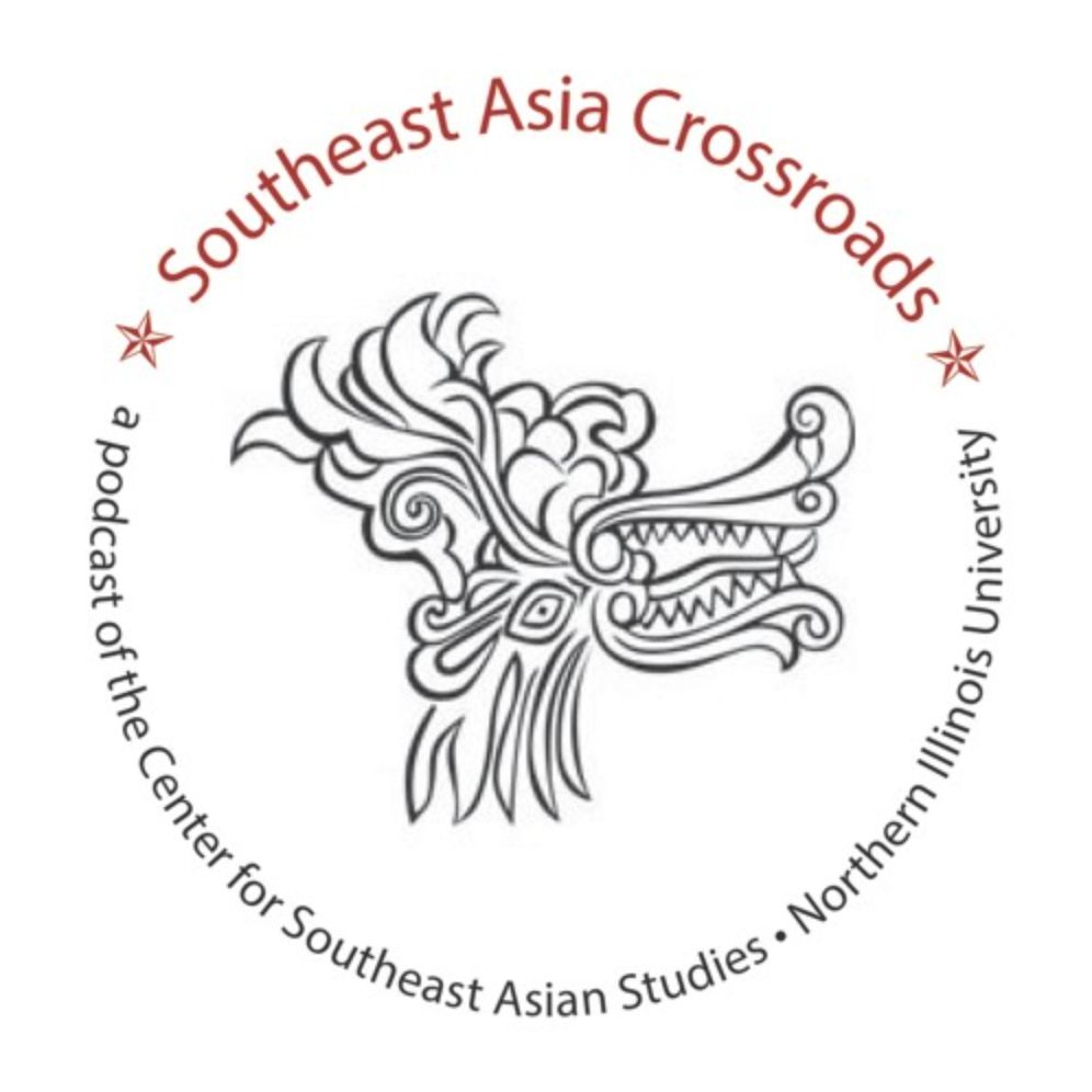Discover Southeast Asia Crossroads Podcast - CSEAS @ NIU
Southeast Asia Crossroads Podcast - CSEAS @ NIU

126 Episodes
Reverse
Donate here: https://foundation.myniu.com/give.php
Ernest Plange Kwofie drops by the studio to discuss ASEAN, or the Association of Southeast Asian Nations. Kwofie talks about the interpersonal politics of the organization and how it differs from similar Western organizations like the European Union. He looks at the organization's effectiveness in responding to threats as well as its ability to implement and enforce policies within its member nations.
Ernest Plange Kwofie is a PhD candidate in the Department of Political Science specializing in comparative politics and international relations at Northern Illinois University.
Dr. Wannasarn Noonsuk joins Dr. Nam Kim to discuss early civilizations in what is now Vietnam and how uncovering creations of the past sheds light on the shifting cultural landscape of ancient Mainland Southeast Asia. They also examine how changing views of the past help to inform local and academic understandings of the region today.
Dr. Nam Kim is a Professor of Anthropology and the Director of the Center for Southeast Asian Studies at the University of Wisconsin-Madison. He studies society and social organization through archaeological artifacts and specializes in Southeast Asia and Vietnam.
Dr. Wannasarn Noonsuk is an associate professor in the Department of Art, Design, and Art History at California State University. He specializes in the archaeology of Peninsular Thailand as well as early maritime trade in Southeast Asia.
Dr. Muzakki Bashori sits down to discuss his new book “When the Rice Cries” a children's story that uses rice idioms to teach about the importance of reducing food waste. Bashori discusses Javanese language conservation and his mission to promote the use of Javanese among children in Indonesia.
Dr. Muzakki Bashori is a Lecturer and researcher at Universitas Negeri Semarang. His research focuses on speech recognition and speaking anxiety as well as the upkeep and revitalization of the Javanese language.
Dr. Joel Selway sits down with Phanuphat Chattragul to discuss his research on shifting notions of Thai identities. He examines Thai identities within the context of various ethnic groups and geographical regions through surveys and interviews.
Dr. Joel Selway is an Associate Professor of Political Science at Brigham Young University. He specializes in studying democratic systems in ethnically diverse societies.
Phanuphat Chattragul is a Ph.D. student in the Department of Political Science at NIU.
Dr. Eliott Prasse Freeman sits down to discuss his new book: “Rights Refused Grassroots Activism and State Violence in Myanmar.” The discussion focuses on the evolution of the concept of human rights, from its categorical, colonial understanding to its impact on modern-day Myanmar. Freeman cites examples of spiritual practices surrounding political protests and the different ways that activists have fought for rights throughout modern history.
Dr. Eliott Prasse Freeman is an Assistant Professor of Sociology and Anthropology at the University of Singapore. He is a Burma Studies specialist who researches human rights, political protest, and violence.
Book available now through Standford University Press at: https://www.sup.org/books/anthropology/rights-refused
Dr. Nora Taylor sits down to discuss Vietnam’s Cold War connections with the Soviet art world. She cites examples of how Soviet-educated Vietnamese artists used what they learned to create art that was critical of colonialism and was reflective of the emergent nationalist landscape.
Dr. Nora Annesley Taylor is an Alsdorf Professor of South and Southeast Asian Art History at the Art Institue of Chicago. She specializes in the study of the contemporary art of Vietnam and Singapore.
Anthony Scott sits down to discuss Buddhism and its effect on the Cold War. Scott dives deep into the history of Buddhism and its impact on politics within Asia. He discusses the rise of Ashin Janakabhivamsa, a popular Burmese monk during the Cold War, especially his radical yet traditionalist ideas about Buddhism and its doctrine. The discussion ends with how Buddhism ideology interacts with Communist ideology.
Anthony Scott is postdoctoral fellow in the Department of Political Science at the University of Toronto.
Professor Chamni Sripraram sits down with 3 NIU students to talk about their Summer: “Song for the Blind” trip. Put together by Professor Chamni, the trip was an opportunity for American students to teach music to visually impaired Thai children. The group reflects and laughs about the experience together, discussing what they learned about other cultures, music, and themselves.
Professor Chamni Sripraram is an adjunct professor teaching “Music of Southeast Asia” and “Music of Thailand” courses and directing the Thai Music Ensemble at NIU.
Dr. Saw Yu May sits down with scholars from Myanmar at NIU, Aye Myat Mon, Khaing Wai Wai Zaw, and Chit Whityi Oo, to discuss the impact the 2021 coup in Myanmar has on education in the country. Together they detail their experiences with the coup, its immediate effects, and how the change of regime influences the culture of education in Myanmar.
Dr. Saw Yu May is a visiting professor of water and environmental studies at the University of Michigan.
Dr. Chit Whityi Oo is a former Fulbright US-ASEAN scholar and postdoc research fellow at NIU specializing in studying water quality and micro plastics.
Khaing Wai Wai Zaw is a former Fulbright FLTA Scholar and currently serves as a research assistant for the Center for Burma studies at NIU.
Aye Myat Mon is a graduate student at NIU pursuing a PHD in instructional technology.
Dr. Kanjana Thepboriruk sits down with Dr. Paul Chambers and Dr. Napisa Waitoolkiat to discuss Paul Chambers’s new book “Praetorian Kingdom: A History of Military Ascendancy in Thailand.” Together they discuss the history of the military in the Thai government and its continued dominance in Thai politics. Chambers examine the rotating roster of pollical players in regimes past and present, and their relationship with loci of power.
Dr. Paul Chambers is a lecturer and researcher. He serves as a lecturer and special advisor at the Centre ASEAN Community Studies at Naresuan University.
Dr. Napisa Waitoolkiat serves as the Dean of the Facuilty of social sciences at Naresuan University.
Dr. Kanjana Thepboriruk is joined by Dr. Paul Wright, Paolo Eslava, and Dr. Jeremy Bulter to discuss physical education in a Southeast Asian Context. The guests share their experiences as practitioners of SEA martial arts and the contributions SEA martial arts have on their professional and personal lives. They reflect on the history of Southeast Asian combat sports and how the competition has evolved due to standardization in the past few decades. Dr. Paul Wright is a Professor of Kinesiology and Physical Education at NIU. His research specializes in Youth Development and social-emotional learning. Paolo Eslava is a graduate student in athletic training at Northern Illinois University. He was the former strength and conditioning coach for the Philippines Pencak Silat National Team. Dr. Jeremy Bulter is the Associate Director of Project FLEX, a sport-based leadership program that teaches life skills through sport to positively impact the lives of incarcerated youth, and an Adjunct Professor of Kinesiology and Physical Education at NIU.
Dr. Kanjana Thepboriruk is joined by Dr. Nicolas Revire and cohost Dr. Catherine Raymond to discuss the mythical golden land of “Suvarṇabhūmi” and its modern-day interpretations. Together they examine competing claims based on archeological records by both Thailand and Myanmar to be the true location of Suvarṇabhūmi. The conversation concludes with a discussion of the challenges of accurately dating artifacts from the region and the continuing repatriation efforts by art historians and museum professionals. Dr. Revire is the current Daniel F. and Ada L. Rice Research Fellow at the Art Institute of Chicago. His research specializes in Buddhist archeology in premodern Southeast Asia. Dr. Raymond is an archeologist and art historian specializing in Theravada Buddhist Art. Dr. Raymond is an Emeritus Professor of Art History and previously served as the director for the Center for Burma Studies at NIU.
Dr. Kanjana Thepboriruk sits down with Dr. Tessa Winkelmann to discuss her new book: Dangerous Intercourse: Gender and Interracial Relations in the American Colonial Philippines 1898 – 1946. They dive into the history of the Philippines during the change from Spanish to American occupation. Winkelmann looks at history through perspectives of various individuals, particularly women, contrasting the reality of interracial relations with American propaganda.
Dr. Tessa Winkelmann is an Associate Professor of History at the University of Nevada Las Vegas, her research specializes in the world, empires and imperialism, ethnic studies, and gender and sexuality studies
Dr. Kanjana sits down with Dr. Aurore Candier and Dr. Catherine Raymond to talk about how Burmese conceptualizations and understandings of governance and political relationships shifted over the course of the 1800s at the beginning of colonial contact. Together they discuss the role of astrology, oral tradition, and rumors within Burmese governance and worldview and what happened with the introduction of print media.
Dr. Candier is a historian and researcher who specializes in the study of Myanmar and the country's changing political landscape throughout history. Working for more than 20 years in Myanmar, she now serves as the Director of the Center for Burma Studies at NIU and an Associate Professor of History.
Dr. Raymond is an archeologist and art historian specializing in Theravada Buddhism arts. Dr. Raymond is an Emeritus Professor of Art History and previously served as the director of the Center for Burma Studies at NIU.
Dr. Kanjana sits down with Dr. Thomas Baudinette and NIU history PhD student Kit Faulk to discuss the rise and propagation of Thai Boy Love (or BL) media. Baudinette goes in-depth into the history of the medium, beginning from its roots in Japan to its eventual explosion within Thai media culture. Together, they discuss the political and social ramifications of BL media within the context of Thailand and what it means for gender and sexuality within the country. Dr. Baudinette is a Senior Lecturer at the Department of Media, Communications, Creative Arts, Language, and Literature at Macquarie University. Focusing on the cultural development of gender and sexuality, he studies LGBTQIA+ culture within Southeast Asia.
Dr. Kanjana is joined by Dr. Ivan Small, the new director of Northern Illinois University’s Center for Southeast Asian Studies. Together they delve into Small’s research documenting the movement of money in and out of Vietnam through remittance. Small discusses the practice and impact of these remittance flows on coastal Vietnamese communities, from a local level to the government’s perspective. Small comes to NIU from the University of Houston in Houston, Texas where he served as an associate professor of anthropology. A cultural anthropologist with training grounded in Southeast Asian studies, Small has years of experience working at higher education institutions. He brings a passion for his work to his role at NIU.
Dr. Kanjana Thepboriruk is joined by Dr. Trude Jacobsen Gidaszewski, Thom brown, and this episode’s guest, Dr. Johnathan Padwe. They are here to discuss Mosquitoes in the lowlands of Southeast Asia. They the human body's ability to create an acquired immunity to Malaria due to the regularity of infection in the lowlands of Southeast Asia, and how this immunity was useful within the ancient Southeast Asian Economy. Dr. Padwe is an assistant professor and researcher at the University of Hawai’i Mānoa. He studies the nature of Southeast Asia, and the anthropology of how ethnic groups and farmers have historically interacted with it.
Dr. Kanjana Thepboriruk sits down with Dr. Pam Barger and Dr. James Cohen to talk about teaching English to speakers of other languages (TESOL) and massive open online courses (MOOCs) in Thailand. They discuss how MOOCs are capable of disrupting the way English is taught while providing universally accessible methods of language learning. Dr. Barger is a Thai American scholar and a professor of English language teaching at Wheaton College. She specializes in Comparative International Education.
Dr. Kanjana Thepboriruk sits down with Dr. Theara Thun to talk about the evolution of ‘knowledge’ and ‘information’ within the Cambodian context, especially with the advent of print media and how the new medium affected the production, transmission, and creation of new knowledge. He dives even deeper, looking at the ways the Khmer understanding of history and documentation shifted to encompass Western systems of bookkeeping while retaining their primary method of aural storytelling. Dr. Theara Thun is a scholar of Southeast Asia, specifically his home nation of Cambodia. He studies the shifting intellectual traditions of Southeast Asia, reflecting on how the changing world affects the development of education and intellectualism within the region.












Very good talk